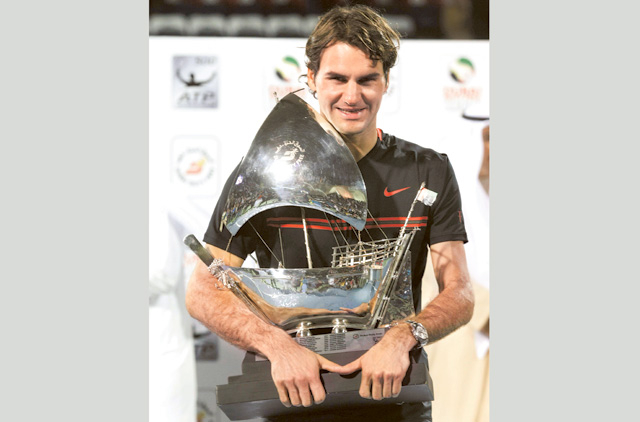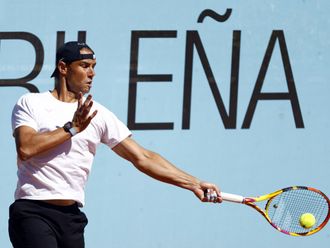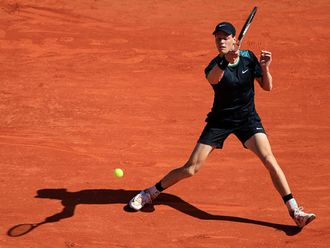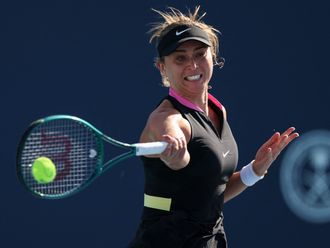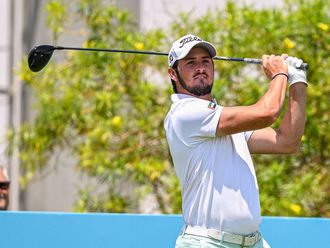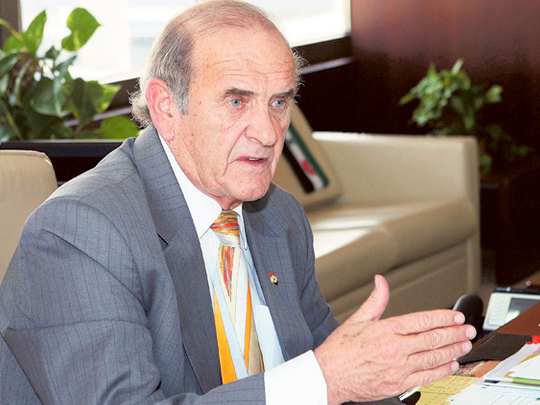
Dubai: Colm McLoughlin is in refitting mode. Along with the size of the Dubai Tennis Championships, the size of the hat he wears as Executive Chairman of Dubai Duty Free, while representing the company that owns the event, just got bigger. He has just acquired more bragging rights.
A year after the championships completed a fruitful and memorable two decades, this year’s edition has thrown up another new surprise in the Aviation Club complex — the arrival of the Jumeirah Creekside Hotel. McLoughlin cannot wait to show it off, or stop talking about it.
Success and survival means that one should constantly keep pace with evolution; to be in sync with the times and trends. In announcing that the hotel, and a brand new refurbished club house, was ready to do business, DDF have stuck another feather in their cap.
By doing so, they have taken the stature of the Dubai Tennis Championships, which begins today, several notches higher in the eyes of the sporting world and particularly the global tennis fraternity.
The small matter of constructing a five-star hotel right in the middle of a club and tennis complex — which, for the record, has been voted as the best tournament in the world in eight out of nine editions — has shown other ATP 500 Series tournaments the path to future success and what the term ‘self-sufficiency’ is all about. Its long-term effectiveness lies in the sheer simplicity of the idea.
Unfortunately, not every organiser, or tournament owner, can do it and, painfully enough, they know it. Suddenly Dubai and Dubai Duty Free are playing a whole new ball game.
“We are very happy that our hotel is up and running,” Colm Mcloughlin told Gulf News. “It opened on July 1 last year. It makes the whole area very complete. You will recall that we were considering moving from here at one stage. We reserved some land at the rugby ground and then went into discussions with Dubai Sports City to set up a stadium there. But the feedback we got from everybody — the organisers, players, ATP and the WTA was that they loved the venue where it was.
“We think what it means for DDF is that we now have our hotel and the players can stay there and the whole area is surrounded in one lovely location. From the point of view of the visitors that come there, which includes the players and the spectators, it is a big plus for the event.”
The logistical challenge has been taken care of: subtly, but effectively. Though this edition of the DTC will have its fresh lessons, the fact that the problems and the advantages are boxed into one unit will streamline operations and troubleshooting to a vast extent.
“For the first year you always get things wrong and you try and correct them,” admitted McLoughlin. “Believe me, we have been making mistakes for 21 years. We patch them up the following year. But we do some very good things as well.
“It’s very convenient that it’s all a one-stop shop. We don’t have difficulties like contracting a limousine service for the players; they don’t have to travel out for anything; they have their practice courts, the gym and physio, everything is on site.
“We also have extra restaurants and extra dining facilities for the spectators and some of the restaurants in the Century Village have been upgraded. So the tennis will be a big test for that. We have refreshed the seating in the stadium so it looks fresh and new. We have even given the courts a new colour — it’s back to being green from blue. It looks terrific. It is better than just a one-stop shop.”
The idea is not to preen over a job well done. If the players’ award to the DTC as the best event on the Tour is an indicator, then DDF are perhaps excelling themselves in the tournament business. The priority, however, is to constantly assess and thereby gain crucial insights on how to keep getting better as a business.
“Putting on a championship like this is a costly affair,” admitted McLoughlin. “I am thrilled that it’s fully managed in-house, apart from a few things that we contract out, like the TV production for example. Last year we assessed that the value put on the attendance and the publicity, which included the media and TV coverage, was $318 million (Dh1.16 billion). We hope to see if it can be improved this year.”
In the high-octane, results-driven world of business in Dubai, there are no tranquil moments. The reaching of one goal immediately means the setting and realisation of another. McLoughlin is well aware that the investment that has gone into the construction of the hotel is not just for the tennis. It must, in the long run, be able to pay for itself as an independent entity. The Century Village and the hugely successful Irish Village are not part of this equation. They are tried and tested performers. The Jumeirah Creekside property, in this respect, stands alone.
“The hotel is a long-term investment,” he agreed. “It has only been opened for six months and the average occupancy is currently at 60 to 65 per cent. We believe this is good. We would see a payback for the hotel in investment cost in about 10 years. This is also very good. Everything else that stands in the overall property has paid for itself.”
The 10-year time frame dovetails perfectly into the overall growth plan that Dubai has envisaged through the announcement of recent mega projects. McLoughlin looks into the next decade with realism. He explains his company’s role in the impending experience that is about to unfold as simplistically as possible. “Many people fly in here for the tennis,” he stated. “We don’t count them, but there is quite a large number. They all spend money in the airport. Our sales figures show that the average spend per person is $48, so if 1,000 people come in and spend at the airport, then that’s around $48,000 income executed.
“The new terminal built called Concourse D will be finished in roughly two years. Capacity will be raised to 95 million. DDF did business for over a billion dollars last year, we now expect that to be $3 billion by 2018. So something like producing the hotel and the tennis tournament is really not a big thing for DDF. It’s quite small in comparison to the loan we raised recently for $1.75 billion to finance some of the infrastructure at the airport. Therefore, by this logic we think that the tennis complex is a winner all the way through.”
It would appear that McLoughlin has already journeyed into the future and back. By his own admission and wealth of experience he brings good reports of what is to come. Dubai is back in the reckoning.
“It’s fantastic,” he exclaimed. “Last month we opened Concourse A. To do that, we recruited 1,600 extra people. It is working well and all the gates are now open. The business that we are doing in Concourse A was similar to the returns we were bringing home from Concourse B. Now that’s been split and we find that the increase over last year is positive. It has also relieved congestion in Concourse B. Concourse D will also finish soon. We will have a layout of 7,000 square metres of retail space in there and then we have Dubai World Central, which will again give us a further 64,000 square metres of retail space.
“We are the biggest producer in the world in terms of income per square metre. We were shortlisted by the Emirates Competitiveness Council as an example company for the global summit that was held here. According to independent research that was done, the crucial observation they managed to obtain was that the average yield per square metre in the duty free industry globally was $34,000 per square metre. DDF was making $80,000 per square metre.”
With that he delivered a closing ace: “By 2020, we would have doubled our business.”


